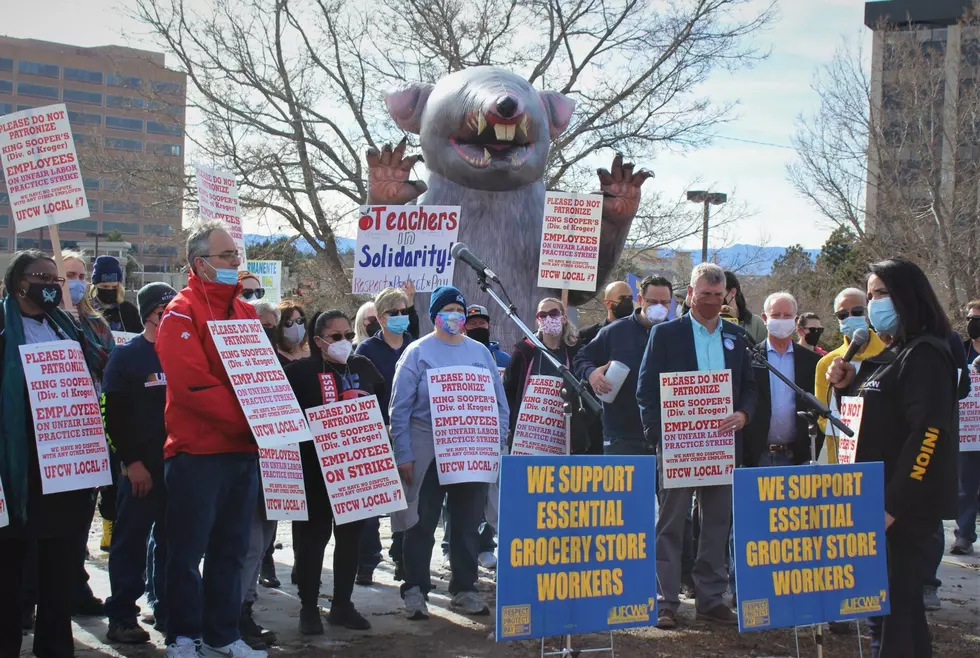
‘Great Resignation is real’: Thousands of Kroger grocery workers strike in Colorado
GLENDALE, Colo. (CN) — Across the Denver metropolis, 8,400 grocery workers from 77 Kroger-owned King Soopers and City Market stores are making more money per hour on strike than they would if they held their post in the store across the parking lot from the picket line.
“The Great Resignation is real, you’re seeing workers across the country say enough is enough,” said UFCW Local 7 union president Kim Cordova. “Workers have been on strike all year, even before we walked out.”
Ninety-five percent of UFCW Local 7 union members working at King Soopers and City Market stores voted to strike this month and walked out Wednesday. At issue, workers say, are fair wages, work safety and respect.
“They called us essential workers when the pandemic started, then they took away our hazard pay after three weeks,” said Candice Haywood, a manager at a store in Aurora. Haywood said customers coughed and spit on her when she tried to enforce the store’s mask requirement,
“Some people say well, you should get a better job and let teenagers do this. Well, teenagers should also be able to make a living wage and take care of their families,” Haywood, who has been with the company nine years, said.
In 1996, when King Soopers workers last went on strike, worker Sandra Almquist said they were compensated $160 a week. Now the union has raised enough money to pay striking workers $20 an hour. In her 26th year with the company, Almquist said she earns $19 an hour, just $3 more than she made in 2006. State minimum wage is $12.56.
By MIT’s Living Wage Calculator, a single person needs to make at least $17.40 an hour to live in Denver. Two adults with two kids who are both working need to make at least $24.81 each.
A white paper published by Economic Roundtable recommends paying Kroger workers $45,760 annually, or $22 an hour for a 40-hour work week. The report, which surveyed 10,000 workers in Washington state, Colorado and Southern California estimated 14% of the grocery giant’s workers are homeless or were in the last year, including 9% of full-time workers.
“Because Kroger’s wage structure is depressed and part-time employment is so prevalent, homelessness still occurs among workers in the top wage bracket,” the report found.
Kroger also owns the Oregon chain Fred Meyer, where workers went on a one-day strike in December.
“I’m pissed because I devoted 38 years to King Soopers and their first offer was a slap in the face,” said Val Lobato, who has been on strike three times for better wages over her career. "I just want an 8-hour job where I can serve customers and make them happy.
“My customers are like family. I told them, ‘If you want me back in there, you have to help me and you can’t shop there now,” Lobato, who is eying retirement, continued. “I tell customers I’m only looking out for your kids."
Although based in Commerce City to the north of Denver, Lobato gathered with hundreds of workers Thursday at a store in Glendale, south of Denver. In front of a large inflatable rat, representatives from several nonprofits and government offices vowed to support the strike, including state treasurer Dave Young and Denver School Board vice president Tay Anderson.
“We have to treat all workers with dignity and respect,” said Anderson, who lives in Denver’s Capital Hill neighborhood and regularly frequents King Soopers. “This is definitely personal, and I refuse to shop at a King Soopers until this is all over.”
Representatives from Kroger did not respond to requests for comment by press time. But in a release, the company called the strike “reckless and self-serving, without regard for the implications to associates and Coloradans.”
"Local 7 is putting politics before people and preventing us from putting more money in our associates' pockets," said Joe Kelley, president of King Soopers and City Market, in a statement. "Creating more disruption for our associates, their families, and Coloradans rather than negotiating for a peaceful resolution is irresponsible and undemocratic."
The grocery stores remain open, staffed by temporary workers, as ads running on the airwaves tout the company’s support of workers.
